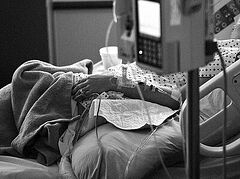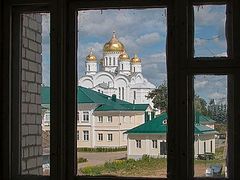Vladimir Stepanovich was obviously not quite himself. Even the Englishmen who were seeing him for the first time noticed it, to say nothing of his colleagues at work who knew him well.
Pale, with a perplexed look and unmoving and somewhat sunken eyes, he was reserved and inhibited. Not only was he late for the negotiations that would be vital for their company (he had been preparing his colleagues for them for a whole year) for the first time in his life, he was also behaving strangely, which clearly alarmed those around him.
After indistinctly greeting those present, he sat down in his armchair without asking the Englishmen (if only as a courtesy) how they had settled down in their new city. After sitting with a vacant look for a few minutes he nodded to his lawyer (so that he could proceed without him), stood up abruptly and headed for the entry of the conference hall.
“I apologize,” he said in a cracked voice to the dumbfounded Englishmen and left without any explanation.
Worried, his secretary dashed out like greased lightning after him.
“Vladimir Stepanovich,” she started with fear. “What’s the matter with you? You can’t just leave us here,” she nodded towards the conference hall significantly. “You have been dreaming of this contract yourself. We have been preparing for it for such a long time. The Englishmen have arrived, but you…”
“Not now, Vera… Do it without me,” he said in an absent tone and a blank gaze. “Do everything without me.” He rushed towards his office and automatically locked the door from inside.
All he wanted now was to be alone. He dropped into the armchair helplessly and held his face in his hands.
The man he had just knocked down with his car on a crosswalk immediately rose up before his eyes. He had been about fifty and was poorly dressed, like some homeless person. Only God knew how he got in front of Vladimir Stepanovich’s car. The man may have been drunk; or maybe Vladimir Stepanovich had been so deeply immersed in thinking about the upcoming negotiations that he didn’t see anything around him.
The pedestrian appeared in front of the car out of the blue. Vladimir Stepanovich automatically turned his steering wheel sharply to the left and caught him crossways on the right side. Hitting the car, the man disappeared somewhere behind it. Vladimir Stepanovich put on the brakes with lightning speed. Then he looked through the side mirror at the pedestrian lying in the middle of the road.
“That’s the end!” was the only thought that flared up in his mind. And he stepped on the gas. Screeching awfully, the car started with a jerk right away. “I’ve got to be in time for that meeting, no matter what! Away from that crosswalk and that unhappy homeless man! Away from the place that could split my life into ‘before’ and ‘after’!” he thought.
His heart was beating so hard it seemed as if it were going to jump out and run somewhere, just as he had run away from the man lying on the crosswalk. Steel hoops seemed to be gripping his head.
“I need to calm down.”
Vladimir Stepanovich rushed to the cupboard and quickly poured himself a glass of whisky. He became thoughtful for an instant and decided not to drink. If he were a smoker, a cigarette wouldn’t be bad. The image of the man he had knocked down lying in the road was in his mind’s eye the whole time. Vladimir Stepanovich went up to the window, as if trying to find the unhappy man amidst the forest of high residential buildings. Suddenly his office got small, the air flowed out of the windows, and his lungs swelled because the space in the room was being filled with vacuum. The office’s closed space resembled a grave.
“I must go out into the fresh air!” he decided and ran out in his suit into the damp and dank autumn weather without putting his coat on. He sponged a cigarette from the first passer-by he chanced to meet and began to smoke.
What would be next? Of course, he would be wanted by the police. And were there any witnesses?
Suddenly he imagined how he looked in the eyes of those around him and indeed of any normal person and his own eyes. He had knocked a man down and fled the scene. Fled!
“What sort of person am I?!” these words escaped him.
Could anyone have imagined an hour earlier that he was capable of that? How much muck was hidden inside him, and had no idea!
How would he go on? How would he go to work? What would he need from his staff? How would he teach his children what was right? How would he tell them about good and evil, right and wrong? How would he talk with his wife? How would he remain decent in her eyes, while knowing his real nature?
He imagined how he would get back home in the evening, take off his coat and be met by his children—Lyuba and Misha. They would run up to him and embrace him. They would ask him if everything was okay and how he had spent the day. And he’d lie to them, saying that everything was fine. Then he’d say the same to his wife. Meanwhile, the man he had knocked down would be lying in the autumn wind in the middle of the street. When the others fell asleep, he would remain face to face with the stranger who would ask him the same questions all night long: “How could you leave me to die?”
Vladimir Stepanovich heatedly and abruptly squeezed his lit cigarette in his fist without noticing the light prick of pain in his palm.
He would be found. He’d surely be found. Then the disgraceful truth about him would become public, the whole world, and—the most terrible thing—to his children. They would say nothing. But they would surely think, “How could he do that?” This question would be the main thing they’d think of him. Forever.
Vladimir Stepanovich headed directly for his office, resolutely picked up the receiver and made a call.
“Duty Major Sinitsyn,” a voice said at the other end of the wire.
Mustering his strength, Vladimir Stepanovich uttered as articulately as he could:
“I knocked down a man at Zelenaya Street about an hour ago.”
“Where is the injured person now?”
“I don’t know.”
“Has he run off?”
“He hasn’t. I ran off.”
“Hang on for a minute.”
Some people exchanged words at the other end of the wire. Then the voice required:
“Your last name. First name. Patronymic. Car number.”
Vladimir Stepanovich mechanically, as though in a daze, replied. Suddenly he felt drained, as if everything were happening to someone else and certainly not to him.
The major discussed something with his colleagues again for a long time.
“We haven’t received any reports of an incidents on Zelenaya Street,” he resumed laconically.
“How can it be?” Vladimir Stepanovich was totally confused. “But I knocked a man down. I caught him on the wing of my car…”
“Once the situation gets clearer, we’ll contact you again.”
“I may do it myself. Please tell me the address and I’ll come.”
“We’ll call you back if needed,” the major snapped and hung up so as to avoid any additional questions.
Vladimir Stepanovich listened to short beeps for a long time, as if trying to decipher the bizarre code. At last he put down the receiver.
He had no thoughts. His brain was silent.
He rose, went outside, got in his car and ten minutes later he was at the scene of the incident—at that ill-fated crosswalk.
The crosswalk was clear.
“A man was knocked down here recently,” he stopped the first passer-by he met.
But the latter only shrugged his shoulders. He pestered a mom with a buggy and a good dozen other passers-by with the same question. But none of them could answer him clearly—they just shrugged their shoulders perplexedly.
Vladimir Stepanovich turned into the yard of the nearest house.
It was quiet around.
Suddenly Vladimir Stepanovich remembered about his mobile phone and took it out instantly.
“Emergency medical service,” a voice responded melancholically.
“I’d like to know if you’ve received a call from Zelenaya Street? A man was knocked down here at the crosswalk about an hour and a half ago.”
The receiver was silent for some while, and then someone’s voice was heard:
“No ambulance was called to the address you’ve given.”
“Thanks.”
He looked around in disappointment. All of a sudden he spotted him—the man who had earlier lain on the road—by the far entrance. The man came out and sat down on a bench beside it.
“Forgive me!” Vladimir Stepanovich walked up to him in a flash.
The man, appearing slightly drunk, looked at the stranger and understood everything.
“Ah, is it you?”
“It’s me,” Vladimir Stepanovich was standing in front of him as before a judge.
“It was my fault,” the man waved his hand. “Shouldn’t drink in the morning…”
He smiled ironically:
“So I should thank you!”
“What for?” Vladimir Stepanovich wondered.
“You stopped me you stopped me on my way to the store to get another bottle.”
“I shouldn’t have run off,” Vladimir Stepanovich continued his apologies.
“Never mind, stop it!” the man waved again. “This also happened to you for some reason.”
“What happened?” Vladimir Stepanovich didn’t understood him again.
“You knocked me down at the crosswalk,” the man grinned, and stretching out his hand in a friendly way, added:
“It’s a sign for us.”
“A sign?” Vladimir Stepanovich was surprised.
The man raised his index finger and pointed at heaven significantly:
“Apparently we were doing something wrong before that crosswalk.”
Vladimir Stepanovich sighed:
“Perhaps you’re right.”
Vladimir Stepanovich at once felt relieved and regained peace of mind. As if there had been no negotiations—once all-important and now so meaningless.




